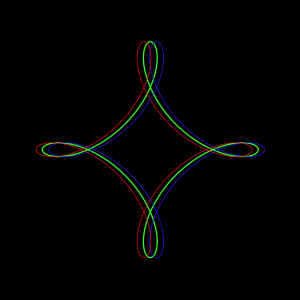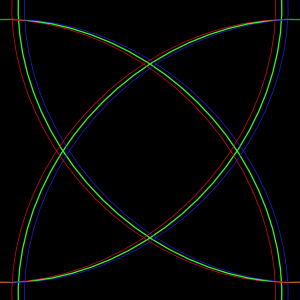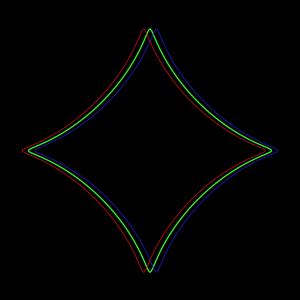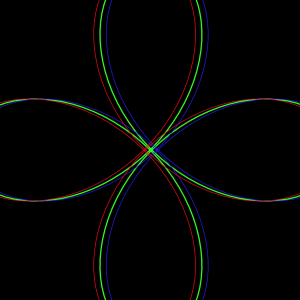// Sophia S Kim
// Section C 1:30
// sophiaki@andrew.cmu.edu
// Project-07-Composition with Curves
var nPoints = 200;
function setup() {
createCanvas(480, 480);
}
function draw() {
background(0);
//middle green diamond
push();
translate(width/2, height/2);
noFill();
strokeWeight(2);
stroke(35, 255, 0);
drawAstroid();
pop();
//right blue diamond
push();
translate((width/2) + 10, height/2);
noFill()
stroke(35, 0, 255);
drawAstroid();
pop();
//left red diamond
push();
translate((width/2) - 10, height/2);
noFill()
stroke(255, 0, 0);
drawAstroid();
pop();
}
//atroid move based on mouseX and mouseY
// Asteroid - http://mathworld.wolfram.com/Astroid.html
function drawAstroid() {
var x; //xvalue for astroid curve
var y; //yvalue for astroid curve
var a; //for mouse X movement
var b; //constrains mouseY values 0 to 300
a = mouseX;
b = constrain(mouseY, 0, 300);
beginShape();
for(var i = 0; i < nPoints; i++) {
var t = map(i, 0, nPoints, 0, TWO_PI);
//for degrees based on i
x = 3 * a * (cos(t)) + b * (cos(3*t));
y = 3 * a * (sin(t)) - b * (sin(3*t));
vertex(x,y);
}
endShape();
}For the “Composition with Curves,” I decided to do an “Astroid” curve, which is a 4-cusped hypocycloid. At first, I was really confused which equation I use for the parametric equations, because the website offered 3 equations for each variable (x, y). I tried all three for each variable to see which one showed the diamond-like shaped curves. Within that process, I got static-like lines, which looked beautiful but was not what I wanted in my final product. After many trials and the right equations, I was able to find the diamond-like curves and create 3 different copies with different colors using push() and pop(). I really liked the way my code turned out, because the changes of the curves reminded me of the Louis Vuitton branding.




![[OLD FALL 2018] 15-104 • Introduction to Computing for Creative Practice](wp-content/uploads/2020/08/stop-banner.png)